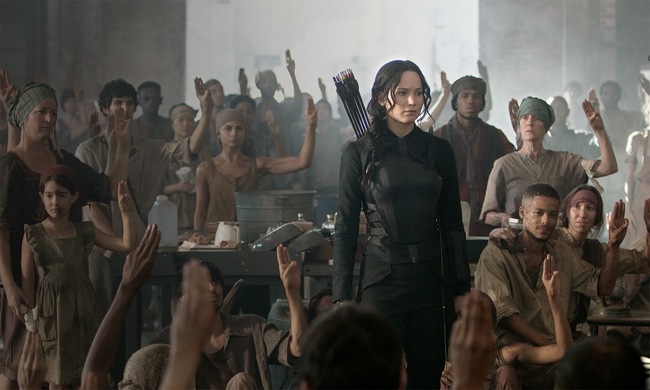Review: The Hunger Games: Mockingjay - Part 1
Directed by Francis Lawrence • 2014 • 123 min
Last year, Catching Fire expanded the political implications of The Hunger Games, building a more complex fictional world than that glimpsed in the series’ first film. The murderous competition that Katniss (Jennifer Lawrence) had been forced into was given more context. The sacrifice of two children from each district was drastic enough to demonstrate the ruthlessness of the government of Panem and President Snow (Donald Sutherland), but minor enough for fear to dictate inaction against a repressive regime. This fear ensured a status quo that was becoming ever more tangible, accessible to us in the audience. And the psychological toll of competing in such a nightmare was visible in Katniss’s own violent dreams and overall signs of PTSD. The series was showing signs of growing up.
In Mockingjay - Part 1, We abandon the games altogether and are faced with revolution. We see more of Panem’s inner workings with the addition of an opposing force in District 13. As Katniss wakes up inside an elaborate underground bunker city, she slowly comes to terms with her role as the Mockingjay, the symbol of the revolution. Under the guidance of (and oftentimes in opposition to) President Alma Coin (Julianne Moore) and her mostly trusted advisor Plutarch Heavensbee (Philip Seymour Hoffman), she learns her place within the movement.
There has been an increasing number of serialized finales to film series in the last few years. In a particularly amusing example, Peter Jackson decided that Part 2 of The Hobbit (already an expanded and divided adaptation of a single book) needed more room to breathe, and turned his Lord of the Rings prequel into a second trilogy. It’s easy to become cynical over such industry tactics, clearly meant to prolong a lucrative franchise, but Mockingjay feels justified in its use of this new blockbuster trope. Without giving a clear sense of how the series will end, the film has time and space to explore the tensions that exist within the resistance movement. This isn’t a David and Goliath narrative in that we are denied the catharsis of victory. Instead, Mockingjay provides a series of character studies and a portrait of revolution, with all of its competing goals and voices made visible, to be concluded in Part 2. If Katniss is a symbol, she is a complicated and conflicted one. We are never sure if she is being used or is cleverly manipulating her superiors to achieve her goals. Most likely a bit of both.
The politics of Mockingjay, while perhaps communicated with blunt directness, show signs of progressive, leftist leanings. The usual commentary on dictatorial rule and war is present: we’re given plenty to hate about President Snow, from his manipulation of Peeta (Josh Hutcherson), alive and in the government’s clutches, to the blatant disregard and even strategic murder of civilians. But what stands out are the film’s direct references to labour rights and union busting, or the need for symbols that, more often than not, are built on propaganda, whether used by the good guys or bad. Snow’s relabelling of rebels as “radicals” in the face of Katniss’s rising status as the “Mockingjay” is just one example (albeit two-sided) of the force a name can give to an idea. Additionally, the film allows for a complex understanding of the ethics of violent resistance. At a time when news outlets debate the use of violence in Ferguson and elsewhere, Mockingjay stands as a treatise on the rights of the oppressed in the face of their oppressors - governing bodies who falsely and conveniently suggest that unrest will lead to more injustice.
Katniss has been a breath of fresh air in the realm of male-dominated action blockbusters. Resourceful, intelligent, strong, vulnerable, and flawed, she is a complex heroine. In Mockingjay, she is joined by other compelling women, each in her own unique position of authority. As part of the Mockingjay strategy, Coin and Heavensbee have arranged for Katniss to be followed by a film unit to produce “propos” or propaganda pieces. The group is led by director Cressida (Natalie Dormer) and made up of two cameramen who follow her creative vision. But most notable is Coin, a president whose strength and authority need not quash signs of her femininity. Coin’s background could so easily have been that of a man. Her husband and daughter killed years before in an air raid, she is a determined leader who quite noticeably challenges Hollywood gender norms repeatedly.
Certainly the best addition to the franchise so far, Mockingjay’s greatest strength is its acknowledgement that no revolution is ever clean. The rules are ill-defined, and the good guys don’t always do what is noble. It offers a realistic group of people in an impossible setting doing what they can to improve their situation.
